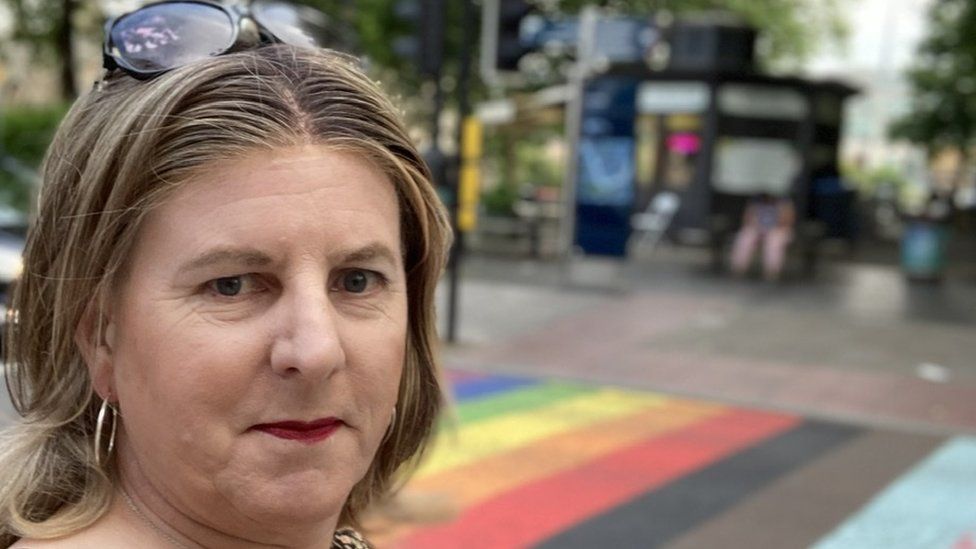Trans people can wait seven years for NHS initial assessment
- Published

Transgender people in England have faced waits of up to seven years for an initial NHS assessment, data seen by the BBC shows.
The South West's only gender identity clinic has the longest backlog, with an average wait of 90 months.
NHS England said people should be seen within 18 weeks of referral and blamed delays on an "increase in demand".
Trans woman Kaz Self, who waited for five years for an appointment, said the system was "dysfunctional".
The second longest average waiting times - after those at the Laurels Exeter Specialist Gender Identity Clinic in Devon - were seen at the recently closed Tavistock gender clinic in London, at 54 months, the figures show.
The lowest average wait of 28 months was at the Nottingham Centre for Transgender Health, the data obtained through a Freedom of Information (FOI) request shows.
The NHS England South West, which covers Exeter, said demand had been "impossible to meet".
It added the service had not been designed for current needs and was being reviewed.
Ms Self had been waiting for an initial appointment since March 2018 before she was seen in 2023 by a clinic in London.
'Not alone'
She is a volunteer for Trans Pride South West team and has been getting private treatment for years.
"I was really concerned to hear from [the clinic] that it may take years to get a follow-up appointment," Ms Self said.
"I had to question the clinician to make sure I heard her say years and not months."
She said she knew trans people were not alone in waiting for healthcare on the NHS.
"But when you then combine that with UK societal attitudes to trans people, I cannot pretend it doesn't have an impact on me," she added.
"As a lone voice it feels that you are hopeless to counteract false narratives and this adds to the anxiety and mental health concerns caused by poor trans healthcare."
While waiting lists are constantly growing, the Exeter clinic has not seen any new patients since 2021.
Other trans people and their families say delays have had a severe impact on their mental and physical health.
Cary (who did not want us to use her real name), 19, has been living as a woman with her new name since September 2020 and has been waiting to receive hormones on the NHS since May 2021.
In the meantime, her mother Nicola has been funding private therapy and hormone treatment.
Nicola believes the way in which Cary has been treated by the NHS amounts to "discrimination in healthcare towards the transgender community".
"I feel as though no one listened to us, so we had to seek help privately," Nicola said.
Cary takes a private testosterone blocking injection every three months, the cost of which varies from £253 to £320 depending on the chemist, her mother said.
'Let down'
"Everything has been done to make sure that transitioning is in her best interest. Cary has been let down by this system," Nicola continued.
"She was put back a year at school due to the anxiety caused by the delays as her mental health deteriorated and she was unable to function in school."
The FOI data obtained by the BBC in 2022 shows while waiting lists are growing at the Exeter clinic, fewer people are being seen for their first assessment each year.
In 2020, the number of people on the waiting list rose to 471 from 392 in 2019, while the number of people in the first assessment phase went down from six to "less than five".
In 2021, there were 597 people on the waiting list and nobody in the first assessment phase.
A spokesperson for the West of England Specialist Gender Identity Clinic (the Laurels) said: "Like similar services across the country, ours has faced a number of challenges over the last few years, including a steep rise in demand, delays with surgery created by the pandemic and difficulty in recruiting to key posts.
"All of these issues have contributed to waiting times that are too long."
Bobbi Pickard, CEO of Trans in the City in Bristol, a charity supporting trans people in business, has privately funded her full transition - while still on the NHS waiting list.
However, not everyone can afford private treatment and most of Bobbi's trans friends are struggling with NHS waiting times, she said.
"Some people have to take second jobs or sell their house. Sometimes this means taking on sex work," the 53-year-old said.
"Sometimes people have no hope of transitioning."
Mindline Trans+, a mental health support service that works with the NHS, said it had been getting many calls from trans people who are worried about the waiting lists.
A supervisor for the service said: "It is detrimental to their mental health and wellbeing, these are high risk calls we are getting.
"Gender dysphoria is a medically recognised condition and the waiting lists are adding to the mental health pressure."
Mermaids, a charity supporting young trans people, proposes opening more local healthcare centres for trans people, something Ms Self has also been campaigning for.
Some cities, including Manchester, have started local pilot schemes that reduce waiting times, by offering trans healthcare specifically for local residents.
The NHS Bristol, North Somerset & South Gloucestershire CCG said: "There has been a huge increase in demand for gender services, with the added complexity of a pandemic, which has been impossible to meet.
"The NHS England South West review has been finished and a procurement process for a new, holistic, non-surgical gender service will be launched shortly."
- For information and support about any issues raised in this story, help is available via the BBC Action Line.
Follow BBC West on Facebook, Twitter and Instagram. Send your story ideas to: bristol@bbc.co.uk
Related Topics
- Published18 February 2023
- Published23 November 2020
- Published30 January 2022